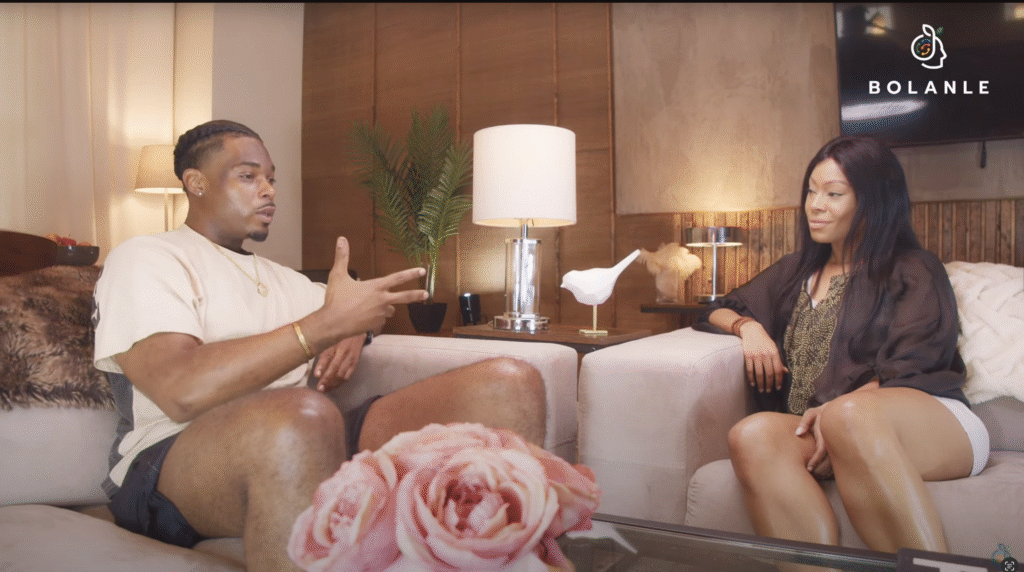Entertainment
Why Did Dakarai Trash His NBA Letters?
Dakarai Akil’s story isn’t the kind fans expect—it’s the kind that leaves them talking. When he sat down with Roselyn Omaka, he didn’t just recount his journey from hardwood glory to movie magic; he dropped a bombshell on anyone invested in formulas or conventional paths. The all-time leader from Dawson High, the ESPN-featured college athlete, walked away from pro offers without a second glance.

The Unthinkable Choice
What compels someone to take a stack of NBA tryout letters, unopened, and dump them straight into the trash? For Dakarai, that moment wasn’t about giving up—it was about finally listening to the thrill in his gut. He recalled writing his first script in college, expecting to jot down ten pages, and coming back with forty because the inspiration was relentless. That passion, he says, is what lit the fuse on a new destiny, one that felt more alive than a future set by others.
Fresh Starts and Hustle
Making that leap meant plunging into the unknown. As soon as the basketball spotlight faded, Dakarai hustled through the grind: selling DirectTV at Sam’s Club, late shifts at UPS, painting for PPG, and landing at Enterprise—all while picking up skills, humility, and heart. “All the dream chasers had to fund the dream,” he laughs. For months, rejection and doubt circled, but Dakarai refused to let others’ doubts dim his vision. He paid for his first camera with grocery money, set up alone, and pressed ‘Play’ on a brand new life.
Originality Over Carbon Copies
Dakarai’s work is fueled by authenticity and obsessive attention to detail. He’s clear:
“Everyone’s a carbon copy now.”
Instead, he crafts stories that reward viewers who pay attention—layered projects with references and details borrowed from his own journey and the legends he admires. Each film, each role, becomes a challenge to the gen-pop formula flooding content platforms.
Only the Beginning
The conversation with Roselyn peels back many layers—a kid who faced rejection, a young man who lost friends by trading jerseys for scripts, and an artist coming to terms with ghost towns at his first premieres, packed only with strangers. Still, Dakarai calls it “just scratching the surface.” His humility is matched only by his ambition to inspire every underdog who quietly watches, waiting for permission and staying true to his own vision.
Lessons from the Legends
Near the end, Dakarai turns reflective, speaking on the greats—Denzel, Samuel L., Morgan Freeman—who “popped at different times.” He’s learned the power of running one’s own race, never timing out on a dream, and celebrating originality over popularity. “Most people just want to be seen. They don’t want to be great. See, I’m the opposite. I focus on greatness, because everybody wants to see greatness,” he shares. It’s a mindset that stands at the heart of his story, signaling that for Dakarai, this isn’t the finish line—it’s the very beginning.
If Dakarai’s path proves anything, it’s that greatness starts when comfort ends and vision begins. His trash can moment wasn’t a mistake—it was an invitation to chase something real. And for all those watching, he’s making one thing clear: open your own letter, no matter when your time comes. Dakarai’s story is nothing short of cinematic. When he sat down with Roselyn Omaka, he peeled back the layers of a journey that broke every rule—and sparked every creative fire. As Dawson High’s legendary scorer and a college basketball star, most assumed Dakarai’s next stop was the pros. But, shockingly, the stack of NBA tryout letters delivered by his coach never saw the light of day—they hit the trash, unopened. Why? Because Dakarai wanted something no one else could see.
The Moment Everything Changed
College was a crossroads. When a film student asked Dakarai to write a script, he went all in—expecting to deliver ten pages and returning with forty, so inspired he couldn’t stop. He describes that moment as his artistic awakening, the moment filmmaking lit up his whole sense of purpose while basketball—despite all its glory—started losing its spark. That passion meant giving up certainty for a mysterious calling, and even the teammates who’d cheered him on couldn’t understand his leap of faith.
Hustling Through the Unknown
Leaving basketball was just page one. Dakarai scraped together jobs: selling DirectTV in Sam’s Club, working at UPS, painting for PPG, and finally learning business at Enterprise—all while saving up for his first real filmmaking tools. Every empty room, every rejection letter, and every side hustle became fuel for the fire, teaching him not just technical skills but how to rebuild from zero, with nothing but faith and ambition.
Breaking Every Mold
Dakarai’s journey is textured—original films stacked with subtle references, storylines that defy stereotypes, and roles far beyond the typical hood drama. He’s as vulnerable as he is determined, facing doubt from the film club that didn’t accept him, and critics who wanted him to stay in his “box.” Instead, he paid for his first camera with grocery money and shot his first film alone, proving that originality is a superpower in a world obsessed with carbon copies.
Wisdom from the Greats
The highlight of Dakarai’s sit-down with Roselyn is his take on studying legends. “I look at journeys for inspiration,” he says, pointing out how Denzel Washington, Samuel L. Jackson, and Morgan Freeman each broke out on their own timeline. There is no expiration date for greatness—and Dakarai’s story echoes that.
“Most people want to be seen. I focus on greatness, because everybody wants to see greatness,” he shares, making it clear that there’s always a next chapter when you’re willing to be yourself.
If Dakarai’s path proves anything, it’s that the beginning is sometimes disguised as the end. His trash can moment means the real story is yet to come—and for anyone watching, it’s the kind of inspiration that invites us all to leap without looking back. Every legend started as an underdog, and Dakarai’s just warming up.